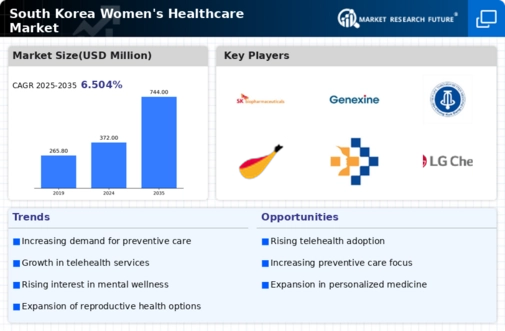South Korea Womens Healthcare Market Summary
The South Korea Women's Healthcare Market is projected to grow from 12.5 USD Billion in 2024 to 20.3 USD Billion by 2035, reflecting a robust CAGR of 4.51%.
Key Market Trends & Highlights
South Korea Women's Healthcare Key Trends and Highlights
- The market valuation is expected to increase from 12.5 USD Billion in 2024 to 20.3 USD Billion by 2035.
- The compound annual growth rate (CAGR) for the period from 2025 to 2035 is estimated at 4.51%.
- This growth trajectory suggests a rising demand for women's healthcare services and products in South Korea.
- Growing adoption of advanced healthcare technologies due to increasing awareness of women's health issues is a major market driver.
Market Size & Forecast
| 2024 Market Size | 12.5 (USD Billion) |
| 2035 Market Size | 20.3 (USD Billion) |
| CAGR (2025 - 2035) | 4.51% |
Major Players
SK Biopharmaceuticals, Genexine, Chong Kun Dang, DongA ST, Korea United Pharm, LG Chem, Hugel, Boryung Pharmaceutical, Celltrion, Yungjin Pharmaceutical, Hanmi Pharmaceutical, AhnGook Pharmaceutical, Samsung Biologics, Daewoong Pharmaceutical, Medtronic





















